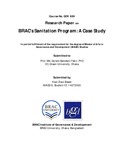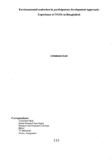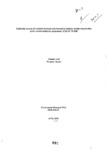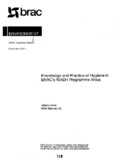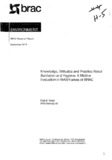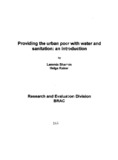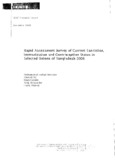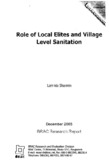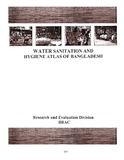Browsing by Subject "Sanitation"
Now showing items 1-15 of 15
-
Assessment of faecal sludge management system in Rohingya response refugees camps, Ukhiya, Cox’s Bazar
(Brac University, 2024-03)Bangladesh is currently experiencing the world’s fastest increasing Rohingya refugee settlement issue. With limited resources and available space, managing feces sludge in emergency settlements with a high population ... -
BRAC’s sanitation program: a case study
(BRAC Univeristy, 2017)Bangladesh has made significant progress in the field of sanitation. Bangladesh Government and some NGOs are working to fulfill the targets set for sanitation in the Millennium Development Goals and the more ambitious ... -
Cluster-randomised controlled trials of individual and combined water, sanitation, hygiene and nutritional interventions in rural Bangladesh and Kenya: the WASH benefits study design and rationale
(© 2013 BMJ Open, 2013)Introduction: Enteric infections are common during the first years of life in low-income countries and contribute to growth faltering with long-term impairment of health and development. Water quality, sanitation, handwashing ... -
Environmental sanitation in participatory development approach: experience of NGOs in Bangladesh
(BRAC Research and Evaluation Division (RED), 1998) -
Exploring reasons of variation in target achievement in sanitary latrine construction under school sanitation programme of BRAC WASH
(BRAC Research and Evaluation Division (RED), 2009-06)Since 2007 BRAC's Water, Sanitation and Hygiene (WASH) programme has been promoting construction of sanitary latrines with water source and waste management provision at the girls' secondary educational institutes in 150 ... -
Getting the basic rights - the role of water, sanitation and hygiene in maternal and reproductive health: a conceptual framework
(© 2015 Blackwell Publishing Ltd, 2015)Objective: To explore linkages between water, sanitation and hygiene (WASH) and maternal and perinatal health via a conceptual approach and a scoping review. Methods: We developed a conceptual framework iteratively, ... -
Isolation of Klebsiella pneumoniae from water and hand swabs of vegetable vendors collected from the wet markets of Dhaka city
(Brac University, 2023-11)Klebsiella pneumoniae (K. pneumoniae) is considered one of the major causes of human hospital infections which is found in human intestine. This bacterium belongs to the Enterobacteriaceae family, and this is a gram-negative, ... -
Knowledge and practice of hygiene in BRAC's WASH Programme areas
(BRAC Research and Evaluation Division (RED), 2011-12)Improved hygiene behaviour is one of the most effective means of reducing disease occurrence. However, question may arise, which factors did contribute to such improvement? Past studies seldom addressed these issues ... -
Knowledge, attitudes and practice about sanitation and hygiene: a midline evaluation in WASH areas of BRAC
(BRAC Research and Evaluation Division (RED), 2010-09)This study aimed to evaluate the impact of BRAC WASH (Water, Sanitation and Hygiene) programme on hygiene knowledge and practice of the people in intervention areas compared to baseline status. A population-based ... -
Providing the urban poor with water and sanitation: an introduction
(BRAC Research and Evaluation Division (RED), 1999) -
Rapid assessment survey of current sanitation immunization and contraception status in selected unions
(BRAC Research and Evaluation Division (RED), 2006-11) -
Role of local elites and village level sanitation
(BRAC Research and Evaluation Division (RED), 2005-12)This study aimed to explore the role of local elites and associated factors that prevent or promote sanitation facilities to the poor. The study was conducted in five communities of tive villages of Nilphamari and ... -
Selling latrines to the poor: how effective it is?
(BRAC Research and Evaluation Division (RED), 1996)BRAC has been promoting personal hygiene practices and the use of safe water and sanitary latrines through its Rural Development Programme (RDP) since 1991. RDP sold a large number of latrines (45,000 as of June 1995) ... -
Ultra poor and asset transfer in Urban setting: Evidence from slums in Bangladesh
(Wiley Online Library, 2016-08-09)We use cross-sectional data to assess the impact of the programme on livelihood where propensity score matching technique has been adopted in analysing the data. Results show that programme participants' self-employment, ... -
Water sanitation and hygiene atlas of Bangladesh
(BRAC Research and Evaluation Division (RED), 2007-12)


